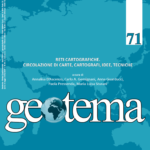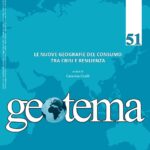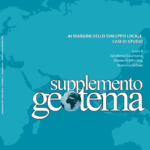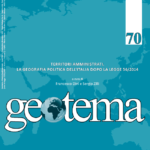Valentina Albanese
Pratiche memoriali nel web semantico. Sentiment analysis e le micronarrazioni territoriali
Le pratiche memoriali (Turco, 2010) piegano la realtà osservata alle aspettative percettive suscitate da esperienze dirette o, in misura crescente, mediate. Le esperienze stesse devono essere correlate all’atteggiamento collettivo nei confronti della conoscenza e del sentimento. Il sentimento è quindi in grado di stabilire quella dipendenza che esiste tra la realtà geografica e la realtà umana (Gusdorf, 1974) in modo tale che la percezione degli altri luoghi sia assorbita con la stessa accettazione di una dichiarazione di realtà (Albanese, 2017a). Conoscere l’impatto delle opinioni (che nel linguaggio web sono appunto i sentimenti o sentiment di cui sopra) e capire fino a che punto possono contribuire all’arricchimento del surplus cognitivo può essere utile non solo per fare un esercizio di interpretazione del senso di un luogo ma anche, e più concretamente,
può essere utile elaborare nuove e più coerenti strategie di crescita con pratiche commemorative e progettuali che esprimono il rapporto tra individuo e società con il territorio. Con questo lavoro proponiamo una disquisizione teorica sull’utilità dell’analisi del sentimento per la geografia e, in un secondo momento, analizzeremo con l’analisi del sentimento il caso di Bologna City of Food per capire come possono contribuire le micro-narrazioni in rete alla costituzione dell’immagine e dell’immaginario della città.
Abstract: Pratiche memoriali in the Semantic Web. Sentiment Analysis to investigate Territorial Micro-narrations
The pratiche memoriali (Turco, 2010) bend the observed reality to the perceptual expectations aroused by direct experiences or, increansingly, mediated. Experiences themselves must be related to the collective attitude to access knowledge and sentiment. The sentiment is therefore able to establish that dependence that exists between geographical reality and human reality (Gusdorf, 1974) such that the perception of the other places is absorbed with the same acceptance of a declaration of reality (Albanese, 2017a). Knowing the impact of opinions (which in web language are sentiment) and understanding to what extent they can contribute to the enrichment of cognitive surplus can be useful not only to make an exercise of interpretation of the sense of a place but also, and more concretely, it can be useful to elaborate new and more coherent growth strategies with memorial and design practices that express the relationship of the individual and society with the territory. With this work we propose a theoretical disquisition on the usefulness of the Sentiment Analysis Methodology for Geographical Research and, in a second moment, we will analyze with the Sentiment Analysis, the case of Bologna City of Food to understand how the micro-narrations on the net can contribute to the constitution of the image and the imaginary of the city.
Résumé: Pratiques mémorielles dans le web sémantique. Sentiment analysis pour l’analyse des micro-récits territoriaux
Les pratiques mémorielles (Turco, 2010) plient la réalité observée aux attentes perceptives suscitées par des expériences directes ou, de plus en plus, médiatisées. Les expériences elles-mêmes doivent être liées à l’attitude collective vers la connaissance et le sentiment. Le sentiment est donc capable d’établir la dépendance existant entre la réalité géographique et la réalité humaine (Gusdorf, 1974) de telle manière que la perception des autres lieux soit absorbée avec la même acceptation d’une déclaration de réalité (Albanese, 2017a). Connaître l’impact des opinions (qui dans le langage web sont précisément les sentiments mentionnés ci-dessus) et comprendre dans quelle mesure elles peuvent contribuer à l’enrichissement du surplus cognitif peut être utile non seulement pour faire un exercice d’interprétation du sens du lieu mais aussi, et plus concrètement, il peut être utile de développer de nouvelles stratégies de croissance plus cohérentes avec des pratiques de commémoration
et conceptuelles qui expriment la relation entre l’individu et la société avec le territoire. Avec ce travail, on propose une analyse théorique de l’utilité de l’analyse des sentiments pour la géographie et, en plus, on envisage d’étudier avec l’analyse des sentiments le cas de Bologna City of Food afin de comprendre comment les micro-récits en ligne peuvent contribuer à la constitution de l’image et de l’imaginaire de la ville.
Parole chiave: semantic web, sentiment analysis, pratiche memoriali, social media narration, Bologna, city of food
Keywords: semantic web, sentiment analysis, pratiche memoriali, social media narration, Bologna, city of food
Mots-clés : web sémantique, sentiment analysis, pratiques memorielles, narrations en ligne, Bologne, ville de l’alimentation









